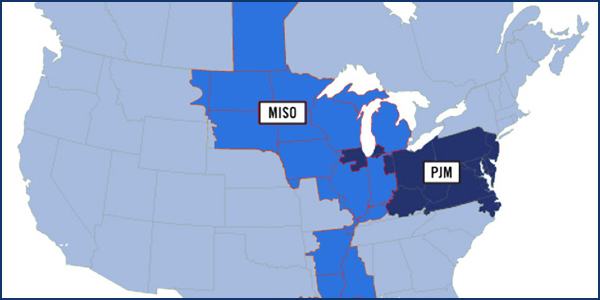By Amanda Durish Cook
FERC last week dismissed a second round of complaints over overlapping pseudo-tie congestion charges between MISO and PJM, rejecting a call that the Midwestern RTO rework its solution and denying rehearing requests over its refund decision.
No MISO Solution Rejection
American Municipal Power had called for a retroactive rejection of the second phase of MISO’s solution to address overlapping congestion charges on pseudo-tied generation, arguing that the RTO failed to prove that all overlapping congestion charges had been resolved (ER19-34-003). The utility also said FERC’s acceptance of PJM’s second-phase solution was conditioned on an expectation that MISO would also develop a voluntary schedule-cutting mechanism like its eastern neighbor.
The RTOs in 2018 agreed to first make limited software changes to account for pseudo-tie transactions in their respective day-ahead markets, then filed separate second-phase solutions to eliminate double-charging. While PJM now provides rebates for deviations from day-ahead commitments and created a new transaction type to hedge exposure to financial risk, MISO added pseudo-tie transaction interchange schedules so pseudo-tied resources can use the day-ahead market to hedge against real-time congestion. (See FERC Approves MISO Pseudo-tie Proposal.)
Contrary to AMP’s claims, pseudo-tie double-charging has been wiped out, FERC said in its order Thursday.
The commission’s decision relied on reports from the RTOs. It said AMP failed to point out any specific Tariff changes in MISO’s second-phase solution that it believed was unreasonable. FERC also said it would not require MISO to restyle its hedging mechanism after PJM’s, noting that several types of hedging mechanisms could be just and reasonable.
The commission also pushed back on AMP’s contention that MISO promised to address any leftover overlap “through rebates or other means” even after the full solution was in place. FERC said neither RTO ever committed in filings to additional rebate mechanisms as part of their second-phase solutions.
FERC also expressed confusion about why AMP was calling for rebates at this point given that PJM now charges or credits congestion where pseudo-tie paths overlap between the RTOs.
The commission in October also rejected a trio of complaints from AMP over how the RTOs eliminated their overlapping congestion charges. The commission said their phased-in pseudo-tie solution did not constitute prohibited “piecemeal” ratemaking. (See MISO-PJM Pseudo-tie Fix Challenges Rejected.)
No Rehearing of Refund Decision
FERC also batted away several requests to rehear its May decision that ordered settlement proceedings to determine how much the RTOs must remit to address redundant congestion costs incurred from 2016 onward. (See Refund Hearing Ordered in Pseudo-Tie Complaint.)
The complainants — including Tilton Energy, AMP, Northern Illinois Municipal Power Agency and Dynegy — relied on a variety of arguments to seek rehearing.
FERC held firm that MISO didn’t violate its Tariff when it began using its financial schedules for pseudo-tied customers without prior approval. The commission said the RTO had the authority to assess congestion charges “in the absence of an explicit Tariff section that applied to the situation” (EL16-108-001).
The commission additionally found that PJM was not in violation of its Tariff for calculating congestion charges from nodal points inside the MISO footprint. The companies had argued that PJM overstepped its authority by reaching into MISO territory to calculate congestion.
“The fact remains that the PJM Tariff explicitly gives PJM the authority to utilize either the source nodal point or the MISO-PJM interface,” FERC said.
The commission also affirmed that only named complainants are entitled to whatever amount of congestion charge refunds stem from settlement. The Illinois Municipal Electric Agency interceded to argue that refunds should extend to everyone affected by the unjust and unreasonable charge — including itself.
“The commission has held that ‘allowing a third party to join in a complaint by filing comments would circumvent our public notice requirements and deprive the respondent of the opportunity to address the assertions of that third party,’” FERC said.
It also declined to extend its usual 15-month refund period as the companies had requested, saying they did not show that the RTOs were slow to act on complex solutions to the duplicative charges.
The commission repeated its stance that the separate administrative charges MISO and PJM assessed on pseudo-tied generation cannot be considered duplicative.
“By taking transmission service in both RTOs, complainants were causing administrative costs to be incurred by both RTOs,” the commission wrote.
Finally, the commission again denied AMP’s previously failed argument that MISO couldn’t guarantee that its phase two solution fully eliminated the double charging.





